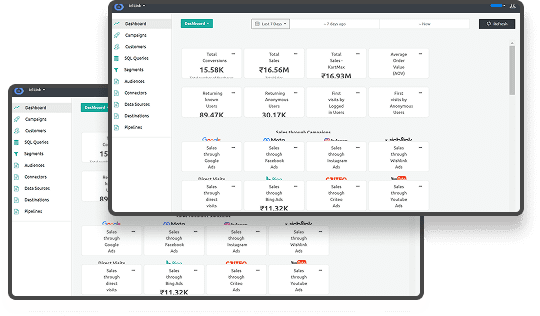The Privacy Revolution in Marketing: A Guide to Navigating the New Landscape
Privacy compliance and user preference are increasingly becoming important, and it's quickly impacting how marketers work. Let's skip the complicated language and focus on what's really happening—because every marketer needs to understand these changes clearly and quickly.
Think of the internet like a busy city square. For a long time, marketers could easily observe people as they passed by, taking notes on behaviors and interests. This allowed marketers to target their messages very effectively—perhaps even too effectively. Eventually, people began feeling uncomfortable, like their personal space was being invaded.
Today, this concern has become a worldwide movement. People everywhere are saying, "My data is mine, and I want control over it." Governments around the globe are paying attention, creating privacy regulations to protect individuals. These new Marketing data privacy rules aren't just minor adjustments; they're a major shift in how marketing operates.
Marketers must adapt quickly to these changes because they're transforming the way we connect with customers online.
In this guide, you'll discover the importance of marketing data privacy, why it's critical for your business strategy, how regulations affect your marketing practices, and how you can navigate this new privacy-focused environment effectively.
Key Global Privacy Trends Reshaping Marketing and Data Protection
It's not just about one law here or there; it's a series of key trends that are changing how marketing data privacy is viewed and how marketers need to adapt:
1. Privacy: A Human Right, Not Just a Legal Requirement
Marketing data privacy is no longer just about ticking off legal boxes. It is increasingly seen as a fundamental human right, similar to freedom of speech or assembly. This shift in mindset means privacy regulations are moving beyond technical compliance and focusing more on respecting individuals' control over their digital lives. This isn't just about what is legally allowed; it’s about what is morally right.
Example: Companies are moving beyond simple cookie banners and are now offering privacy dashboards. These are personal control panels where users can actively manage their data, update preferences, or delete information. It’s about giving real power to the user. For more on how ethical data collection plays a crucial role in building trust, check out How Ethical Data Collection Builds Trust and Fuels Business Growth.
2. Global Reach is the New Reality:
Once seen as a "Europe thing," GDPR has sparked privacy laws across the globe. Countries like California, Brazil, and South Africa have introduced their own privacy regulations, and the trend is spreading quickly. If you're marketing online, you're marketing to a global audience, which means you need to consider global privacy standards, not just local rules.
- Example: Many multinational companies are realizing it’s easier and smarter to adopt a single, high-standard global privacy policy rather than dealing with different rules in each region. It’s a "privacy-first, everywhere" approach. To understand how GDPR works, read Understanding the General Data Protection Regulation (GDPR): Law, Meaning, and Rules.
3. Power to the People: User Control is King:
Regulations are focusing on giving individuals more control over their personal data. This includes:
- Stronger Consent: No more pre-ticked boxes or hidden clauses. Consent must be clear, freely given, and informed. Users should have simple "yes" or "no" options with easy-to-understand language before their data is collected.
- Example: Mobile apps now ask upfront: "Do you want to receive marketing emails? Yes or No?" This is done in simple, clear language instead of automatically opting users in. Learn more about how UTM parameters can help in tracking campaigns and maintaining consent, read UTM Parameters and Best Practices for Tracking Campaigns.
- Example: Mobile apps now ask upfront: "Do you want to receive marketing emails? Yes or No?" This is done in simple, clear language instead of automatically opting users in. Learn more about how UTM parameters can help in tracking campaigns and maintaining consent, read UTM Parameters and Best Practices for Tracking Campaigns.
- Data Rights Exploding: People now have more rights to access, correct, delete, and limit how their data is used. This shift focuses on transparency and accountability.
- Example: Social media platforms are making it easy to download all your data – posts, messages, everything. Users now expect this level of transparency.
- Example: Social media platforms are making it easy to download all your data – posts, messages, everything. Users now expect this level of transparency.
- Data Portability: Some regions are considering laws that allow users to move their data between services. For example, you could transfer your music preferences from one streaming service to another.
4. Enforcement is Real, and Fines are Huge
These new laws aren’t just suggestions; they’re serious regulations with real enforcement. Regulators are focusing on ensuring compliance, and the penalties for non-compliance are massive—potential fines in the millions or even percentages of global revenue. It's not just about reputation damage; companies now face serious financial risks. If you need help navigating these new rules, consider using the best tools for tracking your digital properties. Learn more by reading Best Tools for Tracking Digital Properties.
5. Collect Less, Use Wisely: Data Minimization & Purpose Limitation
The old approach of collecting as much data as possible is over. New regulations push for data minimization, meaning companies should only collect the data they truly need for a specific purpose. And once collected, that data can only be used for its intended purpose, not for any other uses without renewed consent.
- Example: Online stores are now simplifying sign-up forms, asking only for essential details like email and shipping address, and eliminating unnecessary questions like birthdate at the start. To optimize data collection for campaigns, check out Using UTM Codes for Marketing Campaign Tracking.
6. Privacy Built-In: Privacy by Design & Accountability
Privacy must be a priority from the very beginning of product development. "Privacy by design" means considering privacy at every stage, while accountability ensures that companies can prove they’re complying with privacy standards.
- Example: Tech companies are now forming "privacy review boards" for new products, ensuring that privacy is a key consideration from the initial concept to the final launch. This proactive approach embeds privacy directly into the product development process. To better understand how server-side tagging can support privacy efforts, check out Server-Side Tagging: Why It's Time to Shift the Game.
By making these privacy shifts a priority, businesses can build trust with consumers and stay ahead of evolving regulations. Stay informed about global privacy trends and make adjustments to your marketing strategies accordingly.
What Changing Privacy Rules Mean for Marketing: The Practical Impact
The rules around privacy are changing fast. So, what does this mean for marketers? How does it affect what we do every day in our marketing strategies?
- Untargeted, Lazy Marketing is Out
Traditional, broad marketing strategies targeting everyone with generic ads are quickly becoming outdated. With the rise of privacy regulations, precise, data-driven targeting is becoming more difficult and riskier without clear user consent. To stay ahead, marketers must adopt smarter, more ethical methods to connect with their audience. - First-Party Data & Context are the New Gold
As third-party cookies fade and gaining consent becomes more challenging, first-party data (data collected directly from customers) is becoming more valuable than ever. To succeed, marketers must focus on building strong relationships with customers, offering value in exchange for their data, and implementing contextual marketing strategies—reaching consumers based on their current actions and needs. - Transparency & Honesty: No Choice, It’s Essential
Marketing data Privacy policies must be clear, straightforward, and transparent. Gone are the days of fine print and legal jargon. Be upfront with your audience about what data you collect, why you need it, and how you use it. Trust is essential in today’s privacy-conscious world, and transparency helps build that trust. - Content & Value: The Keys to Connection
Offering valuable content is one of the most effective ways to build first-party relationships and get clear consent from your customers. In this new era, content marketing, personalized experiences, and educational resources (all with the user’s consent) will become even more crucial. Remember the "give to get" principle—by providing real value to your audience, you earn the right to engage with them. - Ethical Data is a Competitive Edge
Brands that go beyond simple compliance and adopt ethical data practices will stand out in the marketplace. In a world where privacy breaches are common, establishing yourself as a privacy-respecting brand can build long-term customer loyalty. Ethical data practices will not only help maintain compliance but also set you apart from competitors who haven’t yet embraced privacy. - New Skills Needed in Marketing Teams
As privacy regulations become more complex, marketing teams will need expertise in privacy laws, data governance, and ethical data handling. This isn’t just a legal issue anymore; it’s a central marketing issue that impacts strategy, technology, and customer relationships. To ensure your team stays ahead, consider upskilling them in these areas.
By making these changes a priority, you’ll ensure that your marketing practices remain relevant, effective, and ethical, all while building stronger relationships with your customers.
Examples in Action: How These Privacy Changes Are Already Impacting Marketing
We’re starting to see the effects of these privacy changes play out in the real world. Here are some examples of how companies are adjusting their strategies to stay compliant with new privacy regulations while still effectively engaging with their customers:
- Simplified Sign-Up Forms: Websites asking for less information upfront, focusing on essential data only.
- Privacy Preference Centers: Websites offering dashboards where users can manage their data settings easily.
- Contextual Advertising: Ads becoming more relevant to the content being viewed right now, rather than relying solely on past browsing history.
- Shift to First-Party Data Strategies: Brands investing heavily in building direct relationships with customers to gather data directly, rather than buying third-party data.
These examples show how businesses are adapting to the evolving privacy landscape. By embracing transparency, simplicity, and ethical data practices, companies can continue to build meaningful relationships with their customers while staying compliant with privacy regulations.
The Cost of Non-Compliance: Hefty Fines
Let’s be clear: ignoring these Marketing data privacy regulations is expensive. Fines are designed to be painful, and they are:
- GDPR Fines: Can reach up to €20 million, or 4% of global annual revenue (whichever is higher). These are serious numbers.
- CCPA/CPRA Fines: Fines are per violation and enforcement is growing in California.
- Global Trend: Many other regulations worldwide are also including significant fines for non-compliance.
Examples of Fines:
We’ve seen numerous fines in the millions and even hundreds of millions of euros levied under GDPR for issues like insufficient consent, data breaches due to poor security, or lack of transparency. Some of the largest fines are calculated as a percentage of global turnover, which is a real wake-up call for big companies.
Want to dive deeper into fines? Check out these resources:
- GDPR Enforcement Trackers: Search online for “GDPR enforcement tracker” – you'll find regularly updated lists of fines, amounts, reasons, and links to official decisions.
- Data Protection Authority Websites (Europe): Each European country's DPA (like the UK's ICO or France's CNIL) often publishes enforcement action details on their websites.
- Privacy News Outlets: Sites like TechCrunch, The Register, and IAPP Daily Dashboard regularly report on significant privacy fines.
Are Privacy Laws Actually Reducing Data Collection?
As privacy laws evolve, one important question arises: Are these laws leading to a reduction in data collection? While it’s difficult to quantify the full extent, the signs suggest significant changes in how businesses are handling data. Privacy laws are shaping the future of data collection, and here’s how:
- Less Data at Sign-Up
Websites are now asking for less personal information upfront. Instead of requesting excessive details, businesses are focusing on gathering only the essential data needed for the user to engage with the website or service. This move towards data minimization ensures that companies are not collecting unnecessary information while also respecting user privacy. - Shift Away from Third-Party Tracking
The advertising industry is moving away from broad, cross-site tracking practices. As third-party cookies become less effective and more regulated, companies are reducing reliance on external tracking tools that gather vast amounts of personal data without consent. This shift means advertisers are moving towards more ethical and privacy-respecting advertising methods. - Growth of Privacy-Enhancing Technologies
With the increasing focus on data protection, there’s been a rise in privacy-enhancing technologies. These tools are designed to minimize data collection, protect user privacy, and comply with privacy regulations. The growing interest in these technologies is an indicator that companies are prioritizing privacy-friendly solutions that limit data use while still enabling effective marketing. - Companies Are Minimizing Data Collection
Many organizations are now publicly committing to reducing the amount of data they collect. This move is largely in response to privacy laws such as GDPR and CCPA, which enforce stricter guidelines on data handling. Companies are prioritizing data minimization and user consent, ensuring they only collect the necessary data for specific purposes. This approach not only aligns with legal requirements but also builds consumer trust. - The Industry Focus is Shifting Toward Privacy
Discussions around ethical data handling and privacy-respecting strategies are becoming central to marketing strategies. Companies are more focused on building trust with their audience by being transparent about their data practices and complying with the latest privacy laws. Privacy is no longer just a legal obligation—it has become a core element of marketing ethics and customer relationships.
While it’s hard to measure the exact reduction in data collection, it’s clear that privacy laws are driving businesses towards more responsible and ethical data practices. Companies are moving toward data minimization, ensuring they collect only what’s necessary, and taking steps to protect consumer privacy.
The Opportunity in Privacy
Adapting to privacy laws is not just about compliance—it’s an opportunity to build stronger relationships with customers. Companies that prioritize privacy, build trust, and treat customer data with respect will thrive in the long run. In today’s privacy-focused world, privacy-respectful marketing isn’t just ethical; it can be more effective.
By embracing marketing data privacy, companies can
- Build Real Connections: When consumers feel their data is being handled ethically, they are more likely to engage with brands and share information voluntarily.
- Foster Loyalty: Trust is a major driver of customer loyalty. Brands that respect privacy build long-lasting relationships with their audience.
- Thrive in a Privacy-First World: Consumers now expect privacy protections, and those who respect these expectations will lead the market.
Rather than seeing privacy as a challenge, businesses should view it as an opportunity to differentiate themselves in the marketplace. Privacy-respecting marketing strategies not only comply with laws but also demonstrate a commitment to customers' well-being, setting the foundation for long-term growth and trust.
How Ingest Labs Helps Marketers Navigate Privacy Regulations and Optimize Data Collection
Ingest Labs offers innovative solutions that help businesses adapt to privacy regulations while improving their data collection, tracking, and marketing strategies. Here’s how we assist marketers:
- Seamless Privacy Compliance: Ingest Labs helps businesses ensure that they comply with the latest privacy laws, including GDPR, CCPA, and other regional regulations, by offering tools that integrate privacy into every stage of marketing.
- First-Party Data Collection: We provide tools that enable businesses to effectively collect and leverage first-party data, building stronger, more transparent relationships with customers while complying with privacy rules.
- Enhanced Tracking Capabilities: Ingest Labs helps businesses track customer interactions across multiple channels while maintaining privacy-respecting practices, ensuring compliance with cookieless tracking and server-side tagging.
- Real-Time Data Insights: Our platform offers real-time analytics that allow marketers to optimize campaigns based on current user behavior while respecting privacy laws. Check out more on Real-Time Data Streaming Unlocked.
Ingest Labs empowers businesses to navigate the complex world of privacy regulations while optimizing their data collection strategies, improving customer trust, and driving more effective marketing campaigns.
Conclusion
Marketing data privacy is no longer optional—it's a fundamental part of effective digital marketing. Businesses that embrace this privacy revolution not only protect themselves from legal risks but also build stronger customer relationships based on transparency and trust.
By understanding privacy regulations, overcoming compliance challenges, and adopting best practices, your brand can successfully navigate this new landscape. Ingest Labs empowers you to easily manage compliance and utilize data ethically, improving your marketing outcomes.
Ready to elevate your marketing strategy with privacy-first practices? Contact Ingest Labs today to learn how we can help you navigate data privacy, ensuring your brand remains trusted and compliant.






